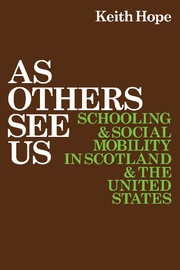Book contents
- Frontmatter
- Contents
- Acknowledgments
- Introduction
- 1 Scotland: A meritelective system?
- 2 Comparison of Scotland with England and Wales
- 3 Comparison of Scotland with the United States
- 4 IQ + effort = merit
- 5 The institutions of managed meritelection
- 6 Was selection carried out fairly?
- 7 Meanings of key terms
- 8 Does deprivation affect life chances?
- 9 Market situation
- 10 Intelligence and occupational mobility
- 11 Intelligence and vertical mobility
- 12 Scottish society
- 13 Understanding other people's norms
- 14 Merit or desert?
- Notes
- References
- Index
- Frontmatter
- Contents
- Acknowledgments
- Introduction
- 1 Scotland: A meritelective system?
- 2 Comparison of Scotland with England and Wales
- 3 Comparison of Scotland with the United States
- 4 IQ + effort = merit
- 5 The institutions of managed meritelection
- 6 Was selection carried out fairly?
- 7 Meanings of key terms
- 8 Does deprivation affect life chances?
- 9 Market situation
- 10 Intelligence and occupational mobility
- 11 Intelligence and vertical mobility
- 12 Scottish society
- 13 Understanding other people's norms
- 14 Merit or desert?
- Notes
- References
- Index
Summary
The classical argument for the study of large aggregations of people, as it was put forward by nineteenth-century sociologists, was that if a sufficiently large group of people was studied, their idiosyncratic features would cancel out and the overall average would approximate to an ideal type. The properties of this ideal type would then reflect the social forces at work in the social roles occupied by the collectivity. The implication of the argument for empirical research is that the individual and idiosyncratic factors which obscure the effects of role membership must be controlled either by randomization or by direct measurement. Since randomization over social roles is rarely achieved, we are thrown back on the necessity for controlling psychological factors by measurement and comparison if we are to study the effect of social differences. Because social factors are usually to some extent correlated with psychological factors, we have to face up to the difficulty of knowing whether, in holding constant a psychological factor, we may be obscuring some part of an independent but correlated social factor.
Latterly, analysts have tended to ignore the logic of the classical formulation of their problem and to assume, implicitly if not explicitly, that the psychological variables can be left to look after themselves while concentrating on the measurement of obviously social factors such as class or education or income. The old logic, however, has never entirely lapsed.
- Type
- Chapter
- Information
- As Others See UsSchooling and Social Mobility in Scotland and the United States, pp. 1 - 4Publisher: Cambridge University PressPrint publication year: 1985
- 1
- Cited by



